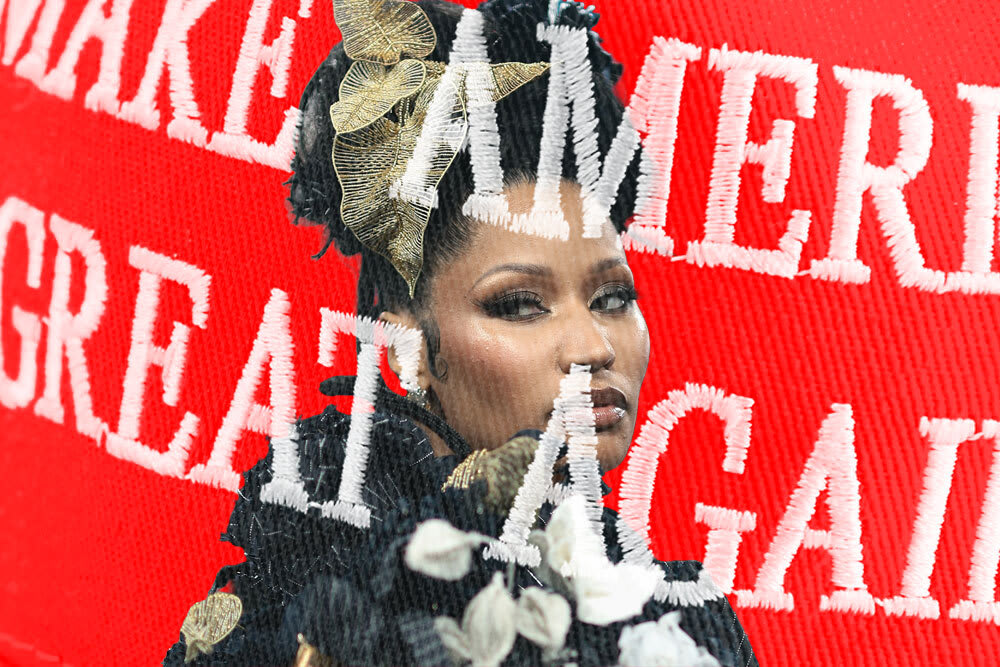Nicki Minaj’s appearance at the United Nations on Tuesday as a guest of the Trump administration surprised a lot of people — though it shouldn’t have. While the 42-year-old rapper and pop star only recently began publicly gushing over President Donald Trump on social media, she’s trended in a MAGA — and generally problematic — direction for a while.
In response to a Nov. 1 post by Trump claiming “Christians are being killed” in Nigeria by “radical Islamists,” Minaj expressed “gratitude” for the message and thanked “the President & his team for taking this seriously.” Just days later, in response to a clip of MAGA campaign bankroller Elon Musk giving a speech about how humanity needs to become a “star-faring civilization,” Minaj tweeted, “Speak Elon, we’re listening.” And when a fan questioned Minaj’s wisdom in boosting the president’s message because of this administration’s anti-LGBTQ policies, the rapper responded, “Imagine hearing that Christians are being MURDERED & making it about you being gay … I’ll advocate for you the same way that I’m advocating for MURDERED CHRISTIANS IN NIGERIA. like I always have. Just remember that.”

But it was Minaj’s appearance at the U.N., standing beside the Trump administration’s ambassador to the U.N. Mike Waltz, that seemed to confirm her full MAGA turn. “I would like to thank President Trump for prioritizing this issue and for his leadership on the global stage in calling for urgent action to defend Christians in Nigeria, to combat extremism, and to bring a stop to violence against those who simply want to exercise their natural right to freedom of religion or belief,” Minaj said in her speech.
Experts on the region have noted that while terrorist violence is widespread, “it is difficult, if not impossible, to delineate the killings based on religious affiliations,” Olayinka Ajala, a scholar who focuses on violent conflicts in West Africa, wrote. Likewise, Nigeria’s Information and National Orientation Minister Mohammed Idris has said the notion of a “deliberate, systematic attack on Christians is inaccurate and harmful.”
This wasn’t the first time that Minaj has indulged in spreading MAGA-style misinformation. Back in 2021, as Covid vaccine skepticism was hardening into a defining pillar of Trumpism, Minaj shared stories that had all the anti-science hallmarks of an urban legend with her 22 million social media followers. “My cousin in Trinidad won’t get the vaccine cuz his friend got it & became impotent,” she wrote, claiming the man’s testicles had swollen so dramatically his traumatized fiance canceled their wedding. It turns out, after scouring the tiny country for the supposed victim of the vaccine, the Trinidadian Health Ministry lamented having “wasted so much time running down this false claim.”
Minaj also said she wouldn’t attend the 2021 MET Gala specifically because of vaccine requirements, and even two years later — despite ample time for reflection — continued to defend her tweets by claiming she prefers to arrive at her “own assessment of everything without help from everyone.” Which is to say, she does her own research.
Minaj has endured both racism and sexism without question — misogynoir is both real and pervasive. But she has also leveraged racism and sexism to her own benefit, like a true Black conservative, using it to deflect from accountability for her own choices. And yet, she has consistently portrayed herself as the victim — a persecuted figure and long-suffering martyr betrayed on all sides. She has claimed that a never-ending line of opps have “spent millions to ruin” her, and that competitors have “made [her] the bad guy.”
But what about some of those choices that have drawn criticism, like her history of associating with sexual predators?
It is unsurprising that Minaj has become part of a movement built around protecting, celebrating and reelecting a man found liable for sexual abuse.
She has repeatedly collaborated with rapper Daniel Hernandez, aka Tekashi 6ix9ine, even after he pleaded guilty in 2015 to felony charges related to the sexual abuse of a 13 year-old-girl when he was 18. Minaj posted bond and, through her lawyers, expressed “100 percent” support of her brother Jelani Maraj when he was accused of repeatedly raping his then-11-year-old stepdaughter. (In 2020, he was sentenced to 25 years to life for the crime). And Minaj’s husband Kenneth Petty served four years in jail on charges related to the 1994 rape of Jennifer Hough.
A lawsuit filed by Hough in 2021 contends Minaj and Petty together undertook a campaign of “intimidation, intentional infliction of emotional distress, negligent infliction of emotional distress, harassment, assault, battery, sexual assault, and sexual harassment” to get her to recant her story — one that included associates of the couple threatening her life.
It is unsurprising that Minaj has become part of a movement built around protecting, celebrating and reelecting a man found liable for sexual abuse. Even one of Minaj’s alter egos, Roman Zolanski, is a play on the name of film director Roman Polanski, who fled the U.S. rather than face charges of drugging and raping a 13-year-old child in 1977.
Minaj blazed a road through rap that is as undeniable as her talent, dominating for a decade, and changing not just hip-hop’s landscape but pop culture writ large. But her outsized image has shown cracks in more recent years, mostly caused by her own hand. Her alignment with MAGA just affirms the leanings we’ve seen from her all along. Too bad it further tarnishes, instead of burnishing, what should be a shining legacy.

Kali Holloway
Kali Holloway is a writer and journalist. She contributes to The Nation, and her writings have appeared in The Guardian, Salon, Time, The Daily Beast and numerous other outlets.










